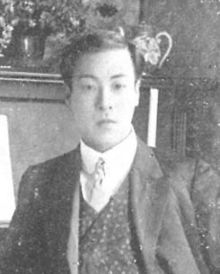Nagayo Motoori
Japanese composer
You can help expand this article with text translated from the corresponding article in Japanese. (June 2018) Click [show] for important translation instructions.
- View a machine-translated version of the Japanese article.
- Machine translation, like DeepL or Google Translate, is a useful starting point for translations, but translators must revise errors as necessary and confirm that the translation is accurate, rather than simply copy-pasting machine-translated text into the English Wikipedia.
- Do not translate text that appears unreliable or low-quality. If possible, verify the text with references provided in the foreign-language article.
- You must provide copyright attribution in the edit summary accompanying your translation by providing an interlanguage link to the source of your translation. A model attribution edit summary is
Content in this edit is translated from the existing Japanese Wikipedia article at [[:ja:本居長世]]; see its history for attribution. - You may also add the template
{{Translated|ja|本居長世}}to the talk page. - For more guidance, see Wikipedia:Translation.
Motoori Nagayo | |
|---|---|
 | |
| Born | (1885-04-04)4 April 1885 Tokyo, Japan |
| Died | 14 October 1945(1945-10-14) (aged 60) |
| Other names | 本居 長世 |
| Occupation | composer |
Nagayo Motoori (sometimes spelled Motohori) (本居 長世 ; 4 April 1885 – 14 October 1945) was a Japanese composer.[1][2][3]
Biography
Selected works
- "Tanpopo" (Dandelion, たんぽぽ), classical children's song to a poem by Shigeru Kuzuhara
- "Akai Kutsu", children's song with lyrics by Ujō Noguchi
- "Aoi me no ningyō" [ja] (Blue-eyed doll), children's song with lyrics by Ujō Noguchi
- "Kisha Poppo" [ja], children's song with lyrics also by Motoori
- Nanatsu no Ko, children's song with lyrics by Ujō Noguchi, recorded by Jean-Pierre Rampal and Ensemble Lunaire in 1978
References
- ^ Phaedrus - Volumes 10-11 - Page 109 1985 The poem by Ujyo Noguchi, one of the leading children's poets of his time was set to music by the composer, Nagayo Moto'ori (1885–1945)
- ^ Haruhiko Kinda'ichi Nagayo Motoori a critical biography of the composer
- ^ 20-seiki no Ajia no sakkyokukatachi - Page 225 Nihon Sakkyokuka Kyōgikai - 2002 "Komatsu, Kiyomi Fujii (1889–1944), and Shinpei Nakayama (1887–1952) based their songs on traditional folk songs, while Yamada, Nagayo Motoori (1885–1945), and Ryutaro Hirota (1892–1952) tried to use idioms of traditional Japanese ..."
- v
- t
- e









